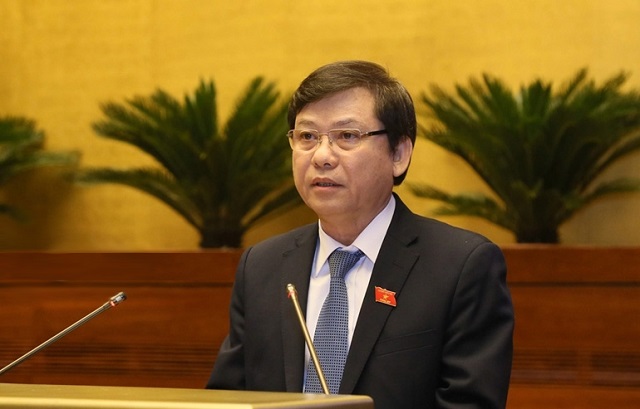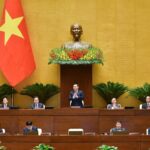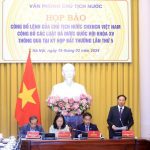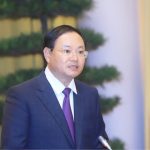On August 26, at the 8th extraordinary session, the National Assembly proceeded to elect several key leadership positions, including that of the Chief Justice of the Supreme People’s Court.
The National Assembly conducted the election of the Chief Justice through a secret ballot. Immediately after following the prescribed steps, based on the vote count, the National Assembly discussed and adopted a resolution to elect the Chief Justice of the Supreme People’s Court for the term 2021-2026.
[ ](https://image.vietstock.vn/2024/08/26/ong-le-minh-tri.jpg)
](https://image.vietstock.vn/2024/08/26/ong-le-minh-tri.jpg)
*Mr. Le Minh Tri, the newly appointed Chief Justice of the Supreme People’s Court of Vietnam*
As a result, Mr. Le Minh Tri, a member of the 13th Central Committee of the Communist Party of Vietnam, was elected by the National Assembly as the Chief Justice of the Supreme People’s Court for the term 2021-2026, with an unanimous vote of 438 out of 438 attending delegates.
Subsequently, Mr. Le Minh Tri took the oath of office.
According to the Law on the Organization of the People’s Courts, the Supreme People’s Court is the highest judicial body in the Socialist Republic of Vietnam.
The Chief Justice of the Supreme People’s Court is elected, removed, or dismissed by the National Assembly upon the proposal of the State President. The term of office of the Chief Justice coincides with that of the National Assembly.
As stipulated in Article 77 of the Law on the Organization of the People’s Courts, the Chief Justice of the Supreme People’s Court is responsible for organizing the Court’s adjudication activities and ensuring the implementation of the principle of independence and adherence to the law by judges and jurors.
The Chief Justice also presides over the meetings of the Council of Judges of the Supreme People’s Court. They have the right to file for a supervisory review or a retrial of a court ruling or judgment that has already taken legal effect, in accordance with the law. Additionally, they submit proposals to the State President regarding cases where convicted individuals request a commutation of a death sentence.
The Chief Justice of the Supreme People’s Court is also authorized to submit proposals to the National Assembly for approval regarding the appointment, removal, or dismissal of judges of the Supreme People’s Court. They also submit proposals to the State President for the appointment, removal, or dismissal of deputy chief justices and judges of the Supreme People’s Court.
Furthermore, the National Assembly also adopted a resolution to elect Mr. Nguyen Huy Tien, Permanent Vice President of the Supreme People’s Procuracy, as the President of the Supreme People’s Procuracy for the term 2021-2026, with an unanimous vote of 439 out of 439 attending delegates.
Mr. Nguyen Huy Tien succeeds Mr. Le Minh Tri, who was recently elected as the Chief Justice of the Supreme People’s Court.
The Supreme People’s Procuracy is the body responsible for prosecuting and supervising judicial activities in the Socialist Republic of Vietnam.
Its duties include protecting the Constitution and laws, human rights and civil liberties, the socialist regime, the interests of the State, and the legitimate rights and interests of organizations and individuals, thereby ensuring strict and uniform compliance with the law.
The President of the Supreme People’s Procuracy is elected, removed, or dismissed by the National Assembly upon the proposal of the State President. Their term of office coincides with that of the National Assembly.
*About Mr. Le Minh Tri:*
Mr. Le Minh Tri was born in 1960 in Cu Chi district, Ho Chi Minh City. He holds a Bachelor of Laws degree from the University of Security.
He is a member of the 13th Central Committee of the Communist Party of Vietnam (since August 2024) and was a member of the 12th and 13th Central Committees. He served as a deputy of the 14th and 15th National Assemblies.
Before moving to the central government, Mr. Le Minh Tri had a long association with Ho Chi Minh City. He worked in the Ho Chi Minh City Public Security, holding positions such as Deputy Head of the Security Staff and Deputy Head of the A12b Division. He also served as Secretary to the Chairman of the City’s People’s Committee and Vice Chairman of the Ho Chi Minh City People’s Committee.
Mr. Le Minh Tri then took on roles as Chairman of District 11 and District 1. From January 2010 to April 2013, he served as Vice Chairman of the Ho Chi Minh City People’s Committee. Subsequently, he worked as Deputy Head of the Central Internal Affairs Commission for three years.
In April 2016, Mr. Le Minh Tri was elected as the President of the Supreme People’s Procuracy, a position he held until his recent appointment as Chief Justice of the Supreme People’s Court.
*By: Nhat Quang*
Chairman of the National Assembly Signs Land Law (Amendment) Certificate
The Land Law (amendment) was passed by the National Assembly during its 5th extraordinary session of the 15th legislature. Following the session, in accordance with the Law on Promulgation of Legal Normative Documents, the relevant agencies conducted a technical review of the text. The President of the National Assembly, Vương Đình Huệ, has authenticated the Law in accordance with regulations.
President’s declaration on Land Law amendment
The amended Land Law consists of 16 chapters and 260 articles, with 180 out of 212 articles from the 2013 Land Law being modified and supplemented, and 78 new articles being introduced.



















